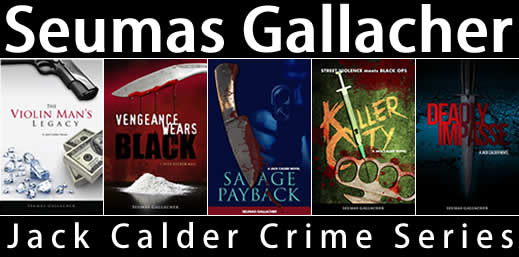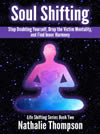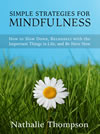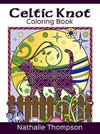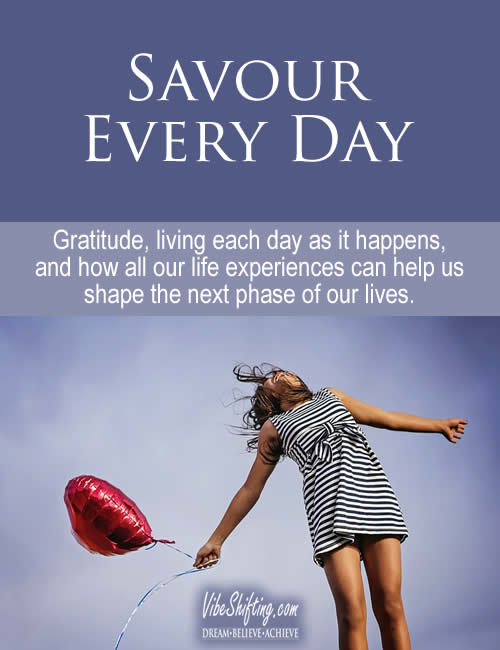 Big career or life transitions can often be frightening things to contemplate, but everything that we experience in our lives can help us shape those new experiences in ways we might not even have thought of consciously. Today’s guest expert, Seumas Gallacher, talks about how his 50 year career in international banking helped shape his work as a successful author of crime thrillers, and he also shares his very inspirational philosophy of life, focused on his belief in the importance of gratitude and living each day as it happens.
Big career or life transitions can often be frightening things to contemplate, but everything that we experience in our lives can help us shape those new experiences in ways we might not even have thought of consciously. Today’s guest expert, Seumas Gallacher, talks about how his 50 year career in international banking helped shape his work as a successful author of crime thrillers, and he also shares his very inspirational philosophy of life, focused on his belief in the importance of gratitude and living each day as it happens.
This Expert Series Guest Interview Has Two Parts:
1810 Savour Every Single Day
1811 Always Be Learning and Trying New Things
[powerpress]
In part two of our interview, which airs next week, Seumas talks about the importance of always learning new things and not getting pigeonholed into being just one thing in life. He also shares more of his inspiring stories, his tips on using social media to build your author platform and connect with others in the writing community, and some words of wisdom from comedian Billy Connolly
Transcript: Savour Every Single Day
Nathalie: Hello everyone and welcome back. Today on The Vibe Shifting Show we’re talking with indie author Seumas Gallacher.
Seumas escaped from the world of finance after retiring from a career that spanned five decades and three continents. Since then he’s published five books in his Jack Calder crime thriller series, and together they’ve racked up over a hundred thousand downloads on Amazon Kindle. Welcome, Seumas, I’m so excited to have you here!
Career Transitions and New Adventures
Seumas: It’s my great pleasure to be with you, Nathalie. How are things?
Nathalie: Things are going very well. And they’re just especially well now that we get to have our conversation. We’ve been trying to put this little interview together for a while.
Seumas: Indeed.
Nathalie: When we were emailing each other trying to set up this interview, I mentioned that I would love to talk to you about that whole concept of career transitions and entering a new stage of life with less trepidation and more excitement about all the possibilities that lie ahead.
Thriller author @seumasgallacher shares his thoughts on gratitude, living each day to the fullest, and using past experiences to shape our ongoing paths. #mindset #LifeLessons Share on XYou Don’t Have to Quit Your Day Job
Nathalie: And I wanted to talk to you about this because writing is kind of a third career for you, is it not? You had a successful career in international finance and after you retired from that career you launched your own consulting business as a specialist in corporate turnaround and now you’re writing, publishing, and selling your own books as an indie author. So you’ve done this transition thing several times over.
Seumas: I have indeed. And in fact, two of them are still concurrent. I’m still doing the corporate advisory and troubleshooting bit, which is basically what I call the day job. The author job for me is where I get my fun. And I think it helps to balance off my mental stability, such as it may be.
But I haven’t found it scary. And given that the fact I’m an old Jurassic these days, I don’t think it should scare me anymore anyway. I just enjoy it.
50 Years a Banker
Nathalie: Oh, that’s wonderful. I think a lot of people… Now, you actually, you spent 50 years, is that right…?
Seumas: 5o years a banker. Yes.
Nathalie: As a banker.
Seumas: Yeah.
Nathalie: But you worked all over the world, primarily in Asia and the Middle East, is that right?
Seumas: Yeah, I went from Europe to the Far East, back into the Middle East, and I’ve had very large chunks of time in each of these… different… different spells in different countries in the Far East. So I’ve seen quite a span…
Nathalie: And that’s all stuff that has helped you with your writing.
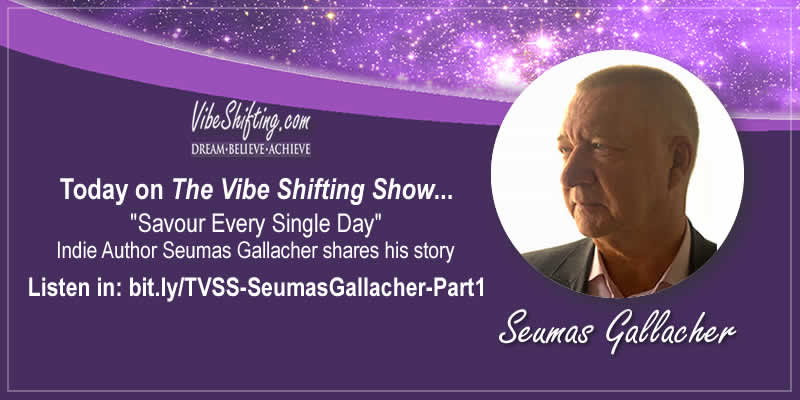
Seeing Retirement as a New Adventure
Nathalie: I think a lot of people they sort of view retirement with a little bit of fear. People sometimes worry, I think, about becoming irrelevant or not being needed anymore.
Or else they sort of have this idealized vision of retirement where you get to play golf all day and do nothing, but then the novelty of that wears off fairly quickly and then it gets replaced by boredom.
But I think sometimes people underestimate the value of everything that they’ve lived and done and all the experience that they’ve gained over the years, and how much that can help shape or inform a new adventure in the next phase of their lives.
Because your background, it not only gave you a lot of the material for your crime series but it also prepared you for the reality of authorship as a business. The reality for authors, and this is especially true for indie writers, is that if you don’t work it as a business you’re probably not going to go anywhere. But most authors really struggle with that.
Seumas: I agree entirely. Now, on the retirement piece, I have formally retired three times.
Nathalie: Three times!
Seumas: Yeah. It’s like they say in the Mafia: You get out and then they pull you back in again. And, frankly, I agree with you that this idiom of going to golf every day gets old very quickly. It’s not at all as exciting and lovely as people imagine. I need my brain to be busy.
It’s All Important
Seumas: And, as you rightly say, in my books I, even subliminally or directly, I pick up on a lot of the things that I’ve had the… the privilege to experience during the course of my career. And that includes people, places, things. And of course, I change the names of the guilty to protect them. You do understand that, right?
Nathalie: Of course. But all of these things that you have done, that you have lived, that you have experienced. They’ve all helped you in your writing. Is that true?
Seumas: Absolutely correct. It contributes… everything… I believe that everything I’ve done up until now has brought me to where I am here. So I shouldn’t garbage any of it. It’s all important to me.
Seumas: And it’s surprising when I read back some of my own stuff, I see little snippets [unclear] and “oh my goodness, yeah I remember where that started in my mind”. And it was years and years and years before. Yes, certainly.
Picking Up On Your Strengths
Seumas: I think it’s not just for bankers becoming authors. I think anybody, from any walk of life would who would decide to take a different turn and do something else would naturally, I think, look back to what they’ve done before and pick up on their strengths and the things that have worked for them. And ditched the stuff that didn’t work.
Because not everyone is privileged enough to be successful in everything they do. Certainly not me. But I pick on the stuff that I prefer to say was good for me. And that’s what I work with.
Even the Failures Can Be Useful
Nathalie: Well I think even those unsuccessful experiences are helpful in many ways. One of the things that I constantly talk about in the stuff that I do is this idea of viewing failure as a process, that it’s part of the process of success.
So our failures… If we can change the way we think about them, they become stepping stones to success. Because every time we fail at something, we learn something. Or at least we should be learning something that we can then use to modify our next attempt and eventually to the success that we’re after.
Seumas: Yeah. I couldn’t agree more. I couldn’t agree more. And there’s an old story, if you’ve got time enough for me to share it, about the old man and the horse. Have you heard that story?
Nathalie: I have not.
What an old man and a horse can teach us about living each day as it happens. #mindfulness #bigpicture Share on XThe Story of the Old Man and the Horse
Seumas: Well the old man the horse, he could be anywhere, but let’s say he’s an old Chinese guy living in the remote part of China. And all he has is a beautiful white horse and a son. And the villagers come to him one day and say “Old man, you should sell that horse and you’ll have everything you want.” He says “Well, I have everything I want.”
A day or so later the horse runs away and the villagers come and say “old man, that’s bad”. He says “I don’t know if it’s bad, I don’t know if it’s good, but I know my horse ran away”. They shrug their shoulders and disappear.
A day or two later the horse returns with six other horses, which now become his horses. So back come the villagers: “Old Man, that’s good.” He says “I don’t know it if it’s good, I don’t know if it’s bad. I just know my horse is back with six more.”
Well, then he sets his son to training the new horses, and he gets thrown and breaks his legs. Back come the villagers: “Old man, that’s bad.” He said: “I don’t know if it’s bad, I don’t know if it’s good. I just know he’s broken his legs.” Away they go again.
A few days later a neighboring province declares war. All the able bodied sons are taken away. His is not. So back they come, “it’s good. And so on and so on it goes on forever.
We Can’t Know the Big Picture
Seumas: But the point of that is, we don’t have the capacity to see further than the next day or two in our lives. And I apply that when I see it in real life when people come to me and they say “Oh my goodness I’ve just lost my job and it’s terrible.” And two or three months later they’ve got a better job.
Or somebody comes and says “My partner and I split up and we’re getting divorced. That’s terrible.” And two or three years later they’re remarried to someone beautifully suited to them, and so on and so on. So, yes, I think that that so-called, in inverted commas, “failure” should drive us on to better things.
Nathalie: I love the way you look at that. It’s… I think a lot of times, when we have something bad happen to us, or something less than what we would like to happen, it’s very easy to look at it as a calamity. And to start looking far out into the future and getting very, very fearful about that. But, as you said, I like that concept of we can’t know what’s going to happen more than a few days away, really.
Always Looking for the Silver Lining
Seumas: Nathalie, I live my life this way, to be honest with you. And, to be frank, this last month, physically and medically, for me has been a bit of a challenge, to say the least.
I discovered a dreadful abscess on my thigh which had to be operated on under emergency anesthetic. That took a huge chunk out of my leg, and I think it reduced my immune system.
And now I’ve got a severe attack of shingles which attacked my left eye. So for the last week I’ve been kind of leaking blood from one eye. But it’s slowed me down. And now I’m starting to feel better.
I feel good about things, and it’s let me do some things that I didn’t have the time to do before. So there you go. There’s the old man and the horse.
Finding the Humour in Every Situation
Nathalie: I think you’re probably the only person I know who can look at that, and… I read your blog, your most recent blog articles preparing for this, so I actually did not know that you were dealing with that until a couple days ago when I read that. And I was just floored. But you just…
Everything that you do, your blog is fascinating. Because you are always so humorous on your blog. No matter what’s happening, you always sort of take a very positive spin to it or look at it… look for the humour in the situation. That’s something my dad taught me many, many, many years ago.

The Story of Nathalie’s Father and the Industrial Dumpster
Nathalie: My house burnt down when I was a kid.
Seumas: Oh dear.
Nathalie: And I still, to this day, remember. It was three weeks before my sister and I were even allowed to see the place, and I remember driving down the street towards the house. And I could see the windows were just black and some were boarded up where the windows had exploded.
But there was this great big dumpster, industrial dumpster parked in the driveway. And my dad slowed down the car and he just burst out laughing. And his friends… my dad was a packrat. He’s always been – had always been – something of a packrat.
Our basement was just piles of his stuff. And his friends used to tease him and tell him that the only way he would ever get his house cleaned up is if he got one of those big industrial dumpsters and started pitching stuff into it.
So when he drove down the street and saw that the insurance company had put one of those out there and we’re starting to clear out the burnt stuff out of the house, he just laughed. He wanted to know if either of us had a camera on us because he wanted to write a sign on a piece of paper, stick it to the dumpster, that says “Took your advice!” and then give the picture to his friends.
So that taught me just how important it is to be able to find the humour in every situation because if we can do that…
A Measure of Gratitude
Seumas: It’s also, if I may say, it’s to have a measure of gratitude in whatever is happening to you. Now, I’m not a religious person. But I am spiritually centered. I am a believer, OK? But I don’t force my religion to anyone else or stuff like that.
But I believe that my day… I only have two kinds of days: I have good days, and I have better days. It’s all I deal in. And I seriously mean that.
When I was waking up with this abscess thing on my leg over the last few weeks it was painful like I couldn’t describe to you. Worse than I would give to my worst enemy. And I’m still saying to myself “This is a good day. I’m still alive. I’m still here. I’m still breathing.”
Because I know many other people… and I watch things around the world. I’m a human being like anybody else. And I see things like these kids trying to get a new life going across the Mediterranean capsizing and drowning and stuff. And I say what’s happening with them compared to what’s happening with me, I’m having a great day already.
Nathalie: Absolutely.
Seumas: This is how it works.
‘I only have two kinds of days: good days and better days. It’s all I deal in.’ Check out this #podcast interview with thriller writer @seumasgallacher! #inspiration #bigpicture Share on XLooking at the Bigger Picture
Nathalie: It is. And I think it’s hard for people to sort of get that, in many cases, I think. It’s because we’re so wrapped up in what we’re dealing with. It’s very hard sometimes, I think, to step out of that and take a look at the bigger picture. But I… your way of looking at the world like that, I think, is probably one of the best things that we could ever do for ourselves.
I think I’m going to frame that concept, by the way: “I only have two kinds of days, good days and even better days.”
Seumas: All lot of it, I know is… Like many millions of people, I mean I’m not different, I’m not unique in this, I come from a slums background. And I have to fight my way into getting what I had. And I was very fortunate. Good people were good in my life all the way through.
Savour Every Single Day
But about 35, 36 years ago, something happened to me which I’m not going to elaborate on, where I was given six weeks to live. And I was on a drip in a hospital in Singapore with six weeks to live. And here I am. I’m still here. So every day to me is a bonus. Every single day.
So I want to laugh at every day. I want to enjoy and savour every single day, every minute I’ve got. And if people say to me “Seumas, what are you on?” I say I’m on life. That’s what I’m on, you know?
Nathalie: I love it.
This has been part one of my interview with author Seumas Gallacher. Tune in next week for part two, in which Seumas talks about his belief in life-long learning and not getting pigeonholed into being or doing just one thing, and he also shares more of his inspirational stories and some words of wisdom from his comedic idol, Billy Connolly.
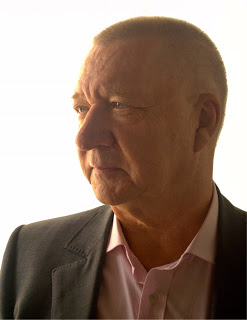
About Today’s Guest Expert:
Indie Author Seumas Gallacher escaped from the world of finance after retiring from a career that spanned five decades and three continents. Since then he’s published five books in his Jack Calder crime thriller series, and together they’ve racked up over a hundred thousand downloads on Amazon Kindle. Connect with Seumas on his website or on Facebook.

